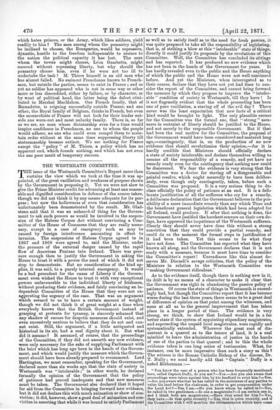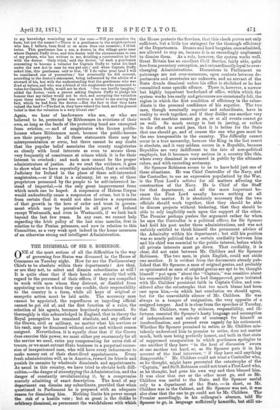THE WESTMEATH COMMITTEE.
THE issue of the Westmeath Committee's Report more than 1 sustains the view which we took at the time it was ap- pointed, of the great vacillation and weakness of purpose shown by the Government in proposing it. Yet we were not slow to give the Prime Minister credit for advancing at least one reason- able and dignified consideration in defence of the course taken, though we did not think it by any means adequate for its pur- pose; but now the hollowness of even that consideration has unfortunately been demonstrated by the result. M. Glad- -atone said that it was an unheard-of thing for the Govern- ment to ask such powers as would be involved in the suspen- nion of the Habeas Corpus Act without convincing a Com- mittee of the House of Commons that they are really neces- sary, except in a case of emergency such as may be caused by foreign interference amounting in effect to invasion. The suspensions of Habeas Corpus agreed to in 1867 and 1868 were agreed to, said the Minister, under the pressure of the external danger caused by the rapid -flow of American Fenians into Ireland. There was pres- -sure enough then to justify the Government in asking the House to trust it with a power the need of which it did not stop to demonstrate. But no consideration of the kind ap- plies, it was said, to a purely internal emergency. It would be a bad precedent for the cause of Liberty if the Govern- ment even wished the House to trust it with very exceptional powers unfavourable to the individual liberty of Irishmen, without producing their evidence, and fairly convincing an in- -dependent Committee of the House that they were not ex- aggerating the urgency of the case. That was an argument which seemed to us to have a certain amount of weight, though we did not think it of great weight at a time when everybody knows that the British Government instead of grasping at pretexts for tyranny, is sincerely ashamed that any shadow of excuse for despotic measures should exist, and even excessively anxious to believe that they do not and can- not exist. Still, the argument, if a little antiquated and historical in its air, had a real dignity about it. But what did it assume It assumed, of course, that the proeeedings of the Committee, if they did not unearth any new evidence, were only necessary for the sake of supplying Parliament with the brief which has long ago been in the hands of the Govern- ment, and which would justify the measure which the Govern- ment should have been already prepared to recommend. Lord Hartington, we must remember, speaking for the Government, declared more than six weeks ago that the state of society in Westmeath was "intolerable ;" in other words, he declared formally the opinion of the Government that the policy of patience had proved inadequate and that new measures must be taken. The Government also declared that it hoped for aid from the Committee in bringing forward new evidence, but it did not declare this with much animation or show of con- viction; it did, however, show a good deal of animation and con- viction in asserting that while it was bound to satisfy Parliament as well as to satisfy itself as to the need for fresh powers, it was quite prepared to take all the responsibility of legislating, that is, of striking a blow at this "intolerable" state of things, directly it could justify its proposals by the revelations of this Committee. Well, the Committee has concluded its sittings and has reported. It has produced no new evidence which has not been in the hands of the Government for years. It has hardly revealed even to the public and the House anything of which the public and the House were not well convinced before. And yet the Ministers, when interrogated as to their course, declare that they have not yet had time to con- sider the report of the Committee, and cannot bring forward the measure by which they propose to improve the " intoler- able " condition of society in Westmeath, till they have ! Is it not flagrantly evident that the whole proceeding has been one of pure vacillation, a staving off of the evil day ? There never was the least expectation that new facts of a critical kind would be brought to light. The only plausible excuse for the Committee was the formal one, that " strong " mea- sures in restraint of liberty should be justified to the House, and not merely to the responsible Government. But if that had been the real motive for the Committee, the proposal of the Government would have been considered and matured long ago,—contingently, that is, on the production of no new evidence that should revolutionize their opinion,—f or it is hardly credible that Ministers should officially declare a state of society intolerable, and declare themselves willing to assume all the responsibility. of a remedy, and yet have no remedy ready even for the contingency that nothing new could be discovered. We fear the evidence is very strong that the Committee was a device for staving off a dishgreeable and painful resolve, which ought assuredly to have been deliber- ately, even though only contingently, taken, before such a Committee was proposed. It is a very serious thing to de- clare officially the policy of patience at an end. It is a deli- berate justification of all the sufferers who cry for a remedy, a deliberate declaration that the Government believes in the pos- sibility of a more immediate remedy than any which Time and the beneficent general legislation which had been adopted for all Ireland, could produce. If after that nothing is done, the Government have justified the harshest censure on their own de- lays, have approved the impatience of the Westmeath sufferers. Clearly they should never have done this without a strong conviction that they could provide a partial remedy, and could do so the moment the formal steps in justification of it had been taken. Yet this seems to be what they have not done. The Committee has reported what they have known all along, and the Government declares that it is not ready with a measure, because it must have time to consider the Committee's report ! Unreadiness like this almost de- serves Mr. Disraeli's savage criticism, that the policy of the Ministers in relation to the Westmeath Committee was "making Government ridiculous."
As to the evidence itself, though there is nothing new in it, its drift is by no means of a character to make it clear that the Government was right in abandoning the passive policy of patience. Of course the state of things in Westmeath is exceed- ingly bad, but though the Committee report that it has become worse during the last three years, there seems to be a great deal of difference of opinion on that point among the witnesses, and none at all as to the general improvement that has taken place in a longer period of time. The evidence is very strong, we think, to show that Ireland would be in a far better state if the system of appointing stipendiary magistrates, and superseding the unpaid local magistrates, were rapidly and systematically extended. Wherever the great root of dis- content is a quarrel as to the tenure of land, it is a real mischief to leave the administration of justice in the hands of one of the parties to that quarrel ; and to this the whole evidence taken is one long series of testimonies. What, for instance, can be more impressive than such a story as this ? The witness is the Roman Catholic Bishop of the diocese, Dr. T. Nully ; we need hardly add that " Captain " Duffy is a noted Ribbonman :— "You know the case of a person who has been frequently mentioned here, called Captain Duffy, do you not ?—Yes.—Are you also aware that proceedings were taken against him by his landlord to evict him ?—Yes. —Are you aware whether he has called in the assistance of any parties to value his land before the chairman, in order to get compensation under the Land Act 2—Yes, I am.—Do you know whom he called in ?—Yes, he called in two gentlemen.—Is one a magistrate ?—I am certain one is, and I think both are magistrates.—Have they acted for him ?—Yes, they have.—Is that quite recently 2—Yes, that is quite recently, and if the Committee wish I will mention the circumstances which have come to my knowledge reminding me of the case.—Will you mention the facts, but not the names ?—There is a gentleman in the neighbourhood who has, I believe, been fired at on more than one occasion ; I think twice. This gentleman has a son, a doctor, in the village quite near where Captain Daffy lives, and this doctor told the circumstance to one of my priests, who has written to me, detailing a conversation he had with the doctor. 'Only think,' said the doctor, of such a gentleman consenting to become a valuator for Captain Duffy to value his land under the new Act in ease he was put out;' and when Captain Duffy asked him, this gentleman said to him, `If I do value your land I will be considered one of yourselves ;' but eventually he did consent, according to the doctor's statement, being influenced by the advice of a steward of his, but with the understanding that the gentleman who was fired at before, and who was a friend of the magistrate who consented to value for Captain Daffy, would not be shot. 'One can hardly imagine,' added the doctor, 'such a person asking Captain Duffy to pledge his honour that my father would not be shot, and accepting the valuation upon these terms.' My priest has written a letter to me stating that fact, which he had from the doctor.—But the fact is that they have valued the land 7—The fact is, they have valued the land, and the general belief is that the valuation is a very liberal one."
Again, we hear of landowners who are, or who are believed to be, protected by Ribbonmen in evictions of their own, so long as the lands of the protecting band are exempted from eviction, — and of magistrates who license public- houses where Ribbonmen meet, because the public-houses are their property. In all these statements there may be misrepresentation or error, but there cannot be any doubt that the popular belief associates the county magistrates so closely with local interests as even to accuse them very frequently of connivance at crimes which it is for their interest to overlook ; and such men cannot be the proper administrators of justice. As we read the evidence, it goes to show what we have repeatedly maintained, that a scientific Judiciary for Ireland in the place of these self-interested magistrates,—or if that is a calumny, let us say, of these proprietors presumed by the people to be self-interested in- stead of impartial,—is the only great improvement from which much can be hoped: A suspension of Habeas Corpus would undoubtedly cause a suspension of crime, but it is far from certain that it would not also involve a suspension of that growth in the love of order and trust in govern- ment which may be perceived in all parts of Ireland except Westmeath, and even in Westmeath, if we look back beyond the last few years. In any case, we cannot help regarding the Irish policy of the last nine months, first in relation to the Fenian prisoners, and now in relation to this Committee, as a very weak spot indeed in the home measures of an otherwise strong and intelligent Administration.



































 Previous page
Previous page